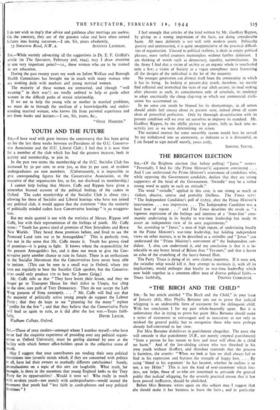Sul,—Those of your readers—amongst whom I number myself—who have never
had the exquisite experience of presiding over any political organi- sation at Oxford University, must be getting alarmed by now at the facility with which former office-holders speak in the collective name of youth.
May I suggest that your contributors are reading their own political convictions into juvenile minds which, if they are concerned with politics at all, have led their owners to markedly different conclusions? Surely, generalisations on a topic of this sort are laughable. What truth, for example, is there in the statement that young England looks to the Tory Party for its opportunities? „Would it were so! Who really in touch With mndetn youth—not merely with undergraduates—would second the tlatemait that youth had "lost faith in catch-phrases and easy political doctrines " ? I feel strongly that articles of the kind written by Mr. Geoffrey Rippon, by giving us a wrong impression of the facts, are doing considerable harm. All most definitely is not well with modern youth. Politically passive and uninterested, it is quite unappreciative of the practical difficul- ties of organisation. Unused to political realities, it deals in empty political phrases, mere verbal counters meaningless without further definition. I sin thinking of words such as democracy, equality, nationalisation. In the Army I find that a vision of society as an organic whole is vouchsafed only a few; a vision of Society as a vague amorphous mass frustrating all the designs of the individual is the lot of the majority.
No younger generation can divorce itself from the community in which it has its being. In looking at present-day youth, therefore, we merely find reflected and intensified the vices of our adult society; its mad seeking after pleasure as such, its consciousness only of externals, its tendency to adopt uncritically the cheap clap-trap to which our commercial civili- sation has accustomed us.
In no sense can youth be blamed for its shortcomings, in all senses should adults feel uneasy about its present state, indeed about all states short of proverbial perfection. Only by thorough dissatisfaction with its present condition will we ever set ourselves to improve its standard. Mr. Geoffrey Rippon, by the idyllic picture he paints, lulls us back into in- activity just as we were determining on action.
The national interest for some unearthly reason would best be served by my withdrawal into an anonymity, as indecent as it is distasteful, so I am forced to sign myself merely, yours truly, SERVING YOUTH.


























 Previous page
Previous page